
Samba is a name or prefix used for several rhythmic variants, such as samba urbano carioca, samba de roda, amongst many other forms of samba, mostly originated in the Rio de Janeiro and Bahia states.

Rush in Rio is a three-disc live album by the Canadian band Rush, released on October 21, 2003. The album is also available as a two-DVD set. With the exception of the last two tracks on the third disc, the album was recorded at Maracanã Stadium in Rio de Janeiro on the final night of the Vapor Trails Tour. The other two tracks were taken from previous shows on the same tour. "Between Sun & Moon" was recorded at the Cricket Wireless Pavilion, Phoenix, Arizona, on September 27, 2002, and "Vital Signs" was recorded at the Colisée Pepsi, Quebec City, Quebec, on October 19, 2002.
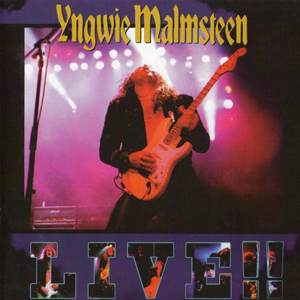
Live!! is a live album by guitarist Yngwie Malmsteen, released in 1998 through Dreamcatcher Records; it was reissued in 2000 as Double Live in the United States through Spitfire Records. The album was recorded live in Brazil on 5–6 May 1998 at the Olympia in São Paulo, and on 7 May 1998 at the Metropolitan in Rio de Janeiro. According to singer Mats Leven, most of the recordings originate from the second night in São Paulo.

Trio Mocotó is a Brazilian band, originally formed in 1968 in the Jogral nightclub in São Paulo, and reformed in 2000. The group was influential in forming the musical style that became known as samba rock or sambalanço. In 1969, they were backing Jorge Ben, being featured on seminal albums Fôrça Bruta, Negro É Lindo and A Tábua de Esmeralda.
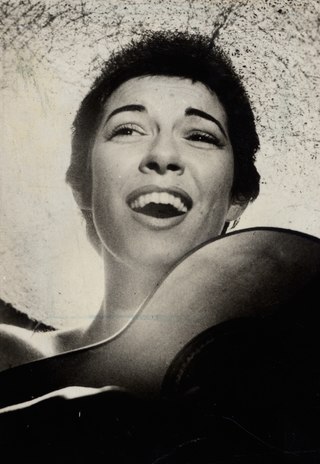
Ignez Magdalena Aranha de Lima Barroso was a Brazilian sertanejo singer, guitarist, actress, TV presenter, librarian, folklorist and teacher.

Tudo Ao Mesmo Tempo Agora is the sixth album by Brazilian rock band Titãs, released on 23 September 1991 via Warner and produced by the band itself, which also, for the first time, is credited as a whole for the songwriting and arrangements, instead of crediting individual members.

Double You are an Italian Techno and Eurodance group founded in 1985 by vocalist William Naraine, keyboardist and producer Franco Amato and DJ Andrea de Antoni. By 1992, they had sold more than three million records. "Please Don't Go", a dance version of KC & the Sunshine Band's 1979 ballad, is one of their major hits.

The Blue Note Jazz Club is a jazz club and restaurant located at 131 West 3rd Street in Greenwich Village, New York City. The club's performance schedule features shows every evening at 8:00 pm and 10:30 pm and a Sunday jazz brunch. The club has locations across the globe in New York, NY; Waikiki, Hawaii; Napa, CA; Tokyo, Japan; Rio de Janeiro, Brazil; São Paulo, Brazil; Milan, Italy; Beijing and Shanghai, China.
Nando Reis & Os Infernais is a Brazilian rock band founded by Nando Reis. It is the band that plays with him in studio and during live performances for his solo albums. From MTV Ao Vivo on, all albums by Nando Reis started being credited to both him and the band. Around the time of Sim e Não's release, he explained the change: "[...] I write songs and we decide the arrangements as a team. It was a gradual perception [the name change from Nando Reis to Nando Reis e os Infernais], when I realized that I liked to be seen as an artist who had a conversation with the band rather than as an artist backed by a band."

Cláudia Cristina Leite Inácio is a Brazilian singer and television personality. She rose to fame in late 2002 as the lead vocalist of the Axé music group Babado Novo. The group achieved a string of consecutive diamond-certified hit singles in Brazil and five golden and platinum albums from 2003 to 2007, as granted by the Brazilian Association of Record Producers (ABPD).
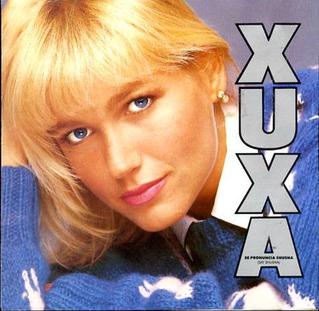
Xuxa is the sixth studio album and the first in the Spanish-language by Brazilian recording artist Xuxa. It was first released on November 18, 1989, in Argentina, Chile, Mexico and United States by the record company Som Livre, in the Latin America in January 1990, and in August of the same year in Europe.

Marcelo de Souza Camelo is a Brazilian composer, singer, guitarist, and poet. He is best known as composer and lead guitarist of the Brazilian band Los Hermanos. Since the end of the band, he continues composing for many interpreters, mainly Maria Rita and Ivete Sangalo. In 2008, his first solo CD, "Sou", was released.

Marlene Dietrich's recording career spanned sixty years, from 1928 until 1988. She introduced the songs "Falling in Love Again " and "See What the Boys in the Back Room Will Have". She first recorded her version of "Lili Marlene" in 1945.

Copacabana Palace, is a hotel in the city of Rio de Janeiro, Brazil, facing Copacabana beach. Designed by French architect Joseph Gire, it was built in a style that follows the line and model of the great beach hotels of the nineteenth and early twentieth centuries, and opened on August 13, 1923.
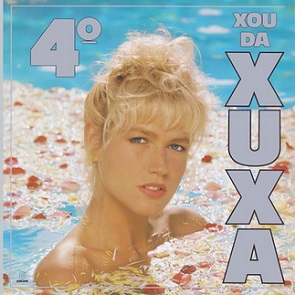
4º Xou da Xuxa is the fifth studio album by Brazilian recording artist Xuxa Meneghel, released on 11 July 1989. This LP was the fourth album of the collection Xou da Xuxa of a total of seven.

Cauby Peixoto was a Brazilian singer, whose career lasted from the late 1940s until his death in 2016. He is known for his deep voice and extravagant mannerisms and hairstyles. He had a brief career in the United States in the 1950s, where he presented under the pseudonyms Ron Coby or Coby Dijon.

Wiedersehen mit Marlene is a Marlene Dietrich's live album, issued on Electrola, catalogue number 1C 062-28 473 MD, in Germany. The American pressing on Capitol Records does not include "Kinder, heut' abend, da such ich mir was aus".

Live at the Café de Paris is a live album by Marlene Dietrich, recorded in London, at her opening night in Café de Paris on June 21, 1954. The orchestra was conducted by George Smith. Dietrich is introduced by Noël Coward.
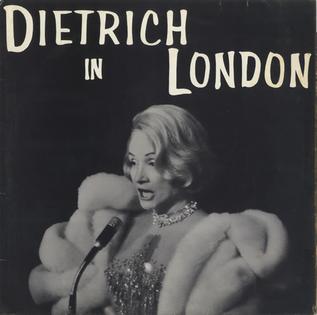
Dietrich in London is a Marlene Dietrich's live album. The album was issued on Columbia Records OS 2830. "Marlene Dietrich in London" opened on November 23, 1964, at the Queen's Theatre. This recording was produced on the closing night, December 12, 1964. The album was released in Australia, by Philips Records in 1965, coincide with her visit in the country.

Marlene Dietrich Overseas was the first Marlene Dietrich album, issued on 10" LP by Columbia Records, released in 1959. All the vocals are in German, translated by Lothar Metzl and the orchestra was conducted by Jimmy Carroll.



















